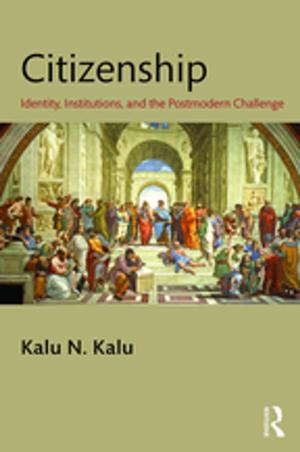The State of American Thought: Ensnared in a fallacious liberal-conservative dichotomy
Nonfiction, Reference & Language, Language Arts, Linguistics, Social & Cultural Studies, Political Science| Author: | Ethan Sewall | ISBN: | 9781301078042 |
| Publisher: | Ethan Sewall | Publication: | March 28, 2013 |
| Imprint: | Smashwords Edition | Language: | English |
| Author: | Ethan Sewall |
| ISBN: | 9781301078042 |
| Publisher: | Ethan Sewall |
| Publication: | March 28, 2013 |
| Imprint: | Smashwords Edition |
| Language: | English |
The state of American thought: Ensnared in a fallacious liberal-conservative dichotomy is a book in two parts. The first part, Deconstructing social construction: Embracing ecumenical humanism, is a theoretical framework of American culture that investigates the way we human Subjects have constructed our social reality. Its purpose is to expose and facilitate the eradication of negative building blocks people have used in that construction that detrimentally affect their lives. Introducing a new brand of humanism called ecumenical humanism, it is premised on the idea that human suffering can be divided into two categories: one consisting of sufferings that are inevitable parts of human life because their causes are beyond our control and the other of sufferings that are not inevitable parts of human life because they are man-made and therefore lie within the realm of our control. Because these two kinds of sufferings have existed since time immemorial, they have become conflated, and the idea of altogether ridding ourselves of even just the man-made ones has not, for the most part, been considered a serious collective possibility. This book provides a comprehensive plan for doing just that.
The second part is the narrative of a preliminary platform of the Ecumenical Humanist International Political Party. The current state of American politics is dismal. Its political class is so entrenched and entangled in a debased system and so devoid of genuinely good ideas and proper perspectives regarding both domestic and international affairs that the people of the United States are suffering in countless unnecessary ways. The two-party system is broken. Simply adding another party to it is not necessarily going to fix it. What is necessary is to add a party to it that actually has the good ideas and fresh perspectives necessary to solve the country’s problems, that is united and specific in taking clear positions on the major issues facing America, and that is not beholden to special interests that block true, positive change for Americans. As the saying goes, two’s company, and three’s a crowd. Well, America is a crowd, and the “company” being kept by Democrats and Republicans is altogether too cozy, bitter though they may be towards each other.
Americans today are locked in a fallacious liberal-conservative dichotomy. They believe that most Americans fall into one category or the other, that the two groups are diametrically opposed to each other in all ways, and that never the twain shall meet. The Ecumenical Humanist International Political Party refuses to partake of this dichotomy but takes the best of both the liberal and conservative traditions, does away with the worst of them, and adds to them a healthy sprinkling of libertarianism to forge a new common ground—not one of compromise, which ends up accomplishing little and disappointing everyone—that satisfies the needs of all Americans.
Overall, The State of American Thought is a different kind of book than most in that in addition to addressing problems it also offers solutions and a real pathway to enacting them. When readers finish reading, they will face the challenge of actively participating in ecumenical humanist behavioral, cultural, and political revolutions. In 2013, America is at a critical junction in its development as a country. Hope for true, positive change is dwindling. The Ecumenical Humanist International Political Party will offer Americans participation in a national—indeed a global—grassroots movement that will bring about such change both for them and for the rest of the world, enhancing people’s health, comfort and security and radically advancing humanity’s progress in its two-and-a-half-millennia-old quest to transition from accepting the creed of might-makes-right to espousing the creed of reason makes right in all its interactions with itself and the other living beings of Earth.
The state of American thought: Ensnared in a fallacious liberal-conservative dichotomy is a book in two parts. The first part, Deconstructing social construction: Embracing ecumenical humanism, is a theoretical framework of American culture that investigates the way we human Subjects have constructed our social reality. Its purpose is to expose and facilitate the eradication of negative building blocks people have used in that construction that detrimentally affect their lives. Introducing a new brand of humanism called ecumenical humanism, it is premised on the idea that human suffering can be divided into two categories: one consisting of sufferings that are inevitable parts of human life because their causes are beyond our control and the other of sufferings that are not inevitable parts of human life because they are man-made and therefore lie within the realm of our control. Because these two kinds of sufferings have existed since time immemorial, they have become conflated, and the idea of altogether ridding ourselves of even just the man-made ones has not, for the most part, been considered a serious collective possibility. This book provides a comprehensive plan for doing just that.
The second part is the narrative of a preliminary platform of the Ecumenical Humanist International Political Party. The current state of American politics is dismal. Its political class is so entrenched and entangled in a debased system and so devoid of genuinely good ideas and proper perspectives regarding both domestic and international affairs that the people of the United States are suffering in countless unnecessary ways. The two-party system is broken. Simply adding another party to it is not necessarily going to fix it. What is necessary is to add a party to it that actually has the good ideas and fresh perspectives necessary to solve the country’s problems, that is united and specific in taking clear positions on the major issues facing America, and that is not beholden to special interests that block true, positive change for Americans. As the saying goes, two’s company, and three’s a crowd. Well, America is a crowd, and the “company” being kept by Democrats and Republicans is altogether too cozy, bitter though they may be towards each other.
Americans today are locked in a fallacious liberal-conservative dichotomy. They believe that most Americans fall into one category or the other, that the two groups are diametrically opposed to each other in all ways, and that never the twain shall meet. The Ecumenical Humanist International Political Party refuses to partake of this dichotomy but takes the best of both the liberal and conservative traditions, does away with the worst of them, and adds to them a healthy sprinkling of libertarianism to forge a new common ground—not one of compromise, which ends up accomplishing little and disappointing everyone—that satisfies the needs of all Americans.
Overall, The State of American Thought is a different kind of book than most in that in addition to addressing problems it also offers solutions and a real pathway to enacting them. When readers finish reading, they will face the challenge of actively participating in ecumenical humanist behavioral, cultural, and political revolutions. In 2013, America is at a critical junction in its development as a country. Hope for true, positive change is dwindling. The Ecumenical Humanist International Political Party will offer Americans participation in a national—indeed a global—grassroots movement that will bring about such change both for them and for the rest of the world, enhancing people’s health, comfort and security and radically advancing humanity’s progress in its two-and-a-half-millennia-old quest to transition from accepting the creed of might-makes-right to espousing the creed of reason makes right in all its interactions with itself and the other living beings of Earth.















